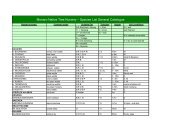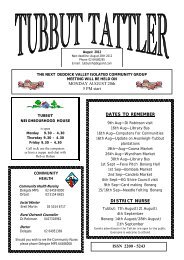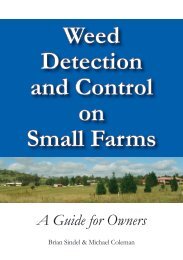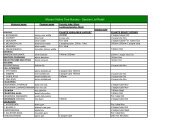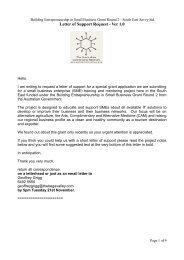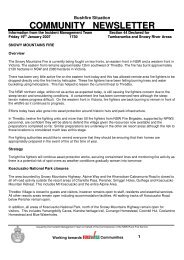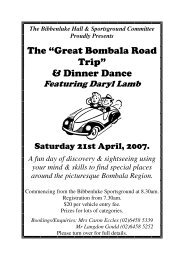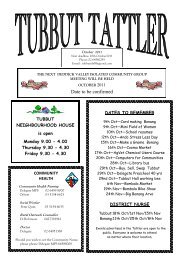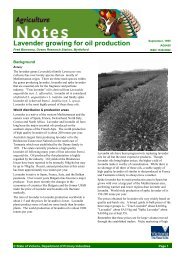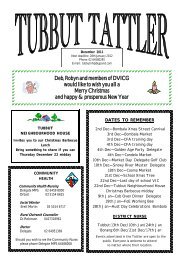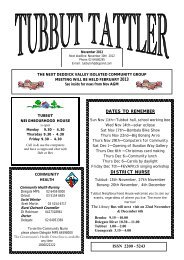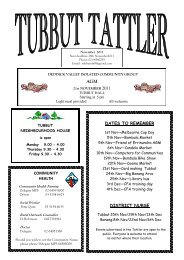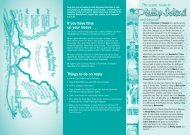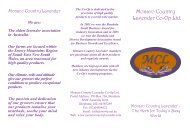COMMUNITY HEALTH DATES TO REMEMBER ... - Platypus Country
COMMUNITY HEALTH DATES TO REMEMBER ... - Platypus Country
COMMUNITY HEALTH DATES TO REMEMBER ... - Platypus Country
You also want an ePaper? Increase the reach of your titles
YUMPU automatically turns print PDFs into web optimized ePapers that Google loves.
May 2012<br />
Next deadline: May 25th 2012<br />
Phone: 02 64580295<br />
E-mail: tubbutnh@bigpond.com<br />
THE NEXT DEDDICK VALLEY ISOLATED <strong>COMMUNITY</strong> GROUP<br />
MEETING WILL BE HELD IN<br />
JUNE<br />
More details in next Tattler<br />
<strong>DATES</strong> <strong>TO</strong> <strong>REMEMBER</strong><br />
TUBBUT<br />
NEIGHBOURHOOD HOUSE<br />
is open<br />
Monday 9.30 - 4.30<br />
Thursday 9.30 - 4.30<br />
Friday 9.30 - 4.30<br />
Call in & use the computers<br />
or have a cuppa and chat with<br />
Deb or Robyn<br />
<strong>COMMUNITY</strong><br />
<strong>HEALTH</strong><br />
Community Health Nursing<br />
Delegate MPS 02 6459 8000<br />
Orbost 03 5154 6625<br />
Social Worker<br />
Brett Martin 03 5154 6717<br />
Rural Outreach Counsellor<br />
Di Robinson 0427318961<br />
Doctor<br />
Delegate 02 64951369<br />
Should you wish to see the Community Nurse,<br />
please phone Delegate MPS 64588008<br />
5th May—Bombala Market<br />
5th May—Dellicknora cemetery walk<br />
6th May—Candelo Market<br />
12th May—Local History Workshop<br />
16th May—Dalgety Women’s Day<br />
18th May—lunch with Danny Thorpe Tubbut<br />
19th May—Towamba Acoustic Session<br />
19th May—Delegate Golf Club Market<br />
19th-20th May—Needle Sculpture workshops<br />
20th May—Cooma Market<br />
20th May—Million Paws Walk Cooma<br />
24th May—School Input Meeting Tubbut<br />
25th May—Library Bus<br />
26th May—First Aid course<br />
29th May—Pamper Day Bonang<br />
29th May—Little Green Frog Bonang<br />
30th May—Responsible Serving of Gaming<br />
30th May—Espresso Coffee Basics<br />
31st May—Photoshop workshop Goongerah<br />
7th Jun—Safe Food Handling<br />
7th Jun—Responsible Serving of Alcohol<br />
DISTRICT NURSE<br />
Tubbut: 1st May/15th May/29th May<br />
Bonang: 8th May/22nd May/5th June<br />
Events advertised in the Tattler are open to the public.<br />
Everyone is welcome to attend
MAY<br />
BIRTHDAYS<br />
Judy Edwards<br />
Kate Ingram<br />
Bev Tyler<br />
Valerie Auer<br />
Jonno Hagger<br />
Kacey Collins<br />
Tom Hagger<br />
Willem Lankhorst<br />
Library Bus<br />
Just a reminder that the Library Bus<br />
will next be visiting the area on<br />
25th May<br />
Bendoc 9.00—9.45<br />
Delegate River 10.45—11.30<br />
Tubbut 1.15—2.15<br />
Bonang 3.00—3.30<br />
Goongerah 4.15—5.00<br />
Boof and Bones<br />
HANDYMEN<br />
“We’ll try our hand at any job”<br />
Trailer for Hire<br />
The Neighbourhood House now has a trailer available<br />
for hire<br />
$5.00 per day<br />
For bookings phone<br />
THE<br />
BOMBALA TIMES, SNOWY RIVER MAIL<br />
& DELEGATE DOINGS<br />
Tubbut Neighbourhood House purchases<br />
a copy of these newspapers<br />
each week.<br />
Call in and browse the current editions<br />
Wood<br />
Ute Load unsplit $120<br />
Ute Load Split $160<br />
Trailer Load Unsplit $50<br />
Trailer Load Split $70<br />
Ute + Trailer Load Unsplit $160<br />
Ute + Trailer Load Split $220<br />
Lawn Mowing/Handymen Service<br />
A flat rate of $20 per hour for this<br />
service<br />
Phone: 0428799157<br />
www.boofandbones.com.au
DALGETY<br />
WOMEN’S DAY 2012<br />
DELEGATE PLAY GROUP<br />
Thursday from 10am-12pm at Delegate Pre-school<br />
Further details:<br />
Tonelle 64588196<br />
Wednesday 16 May<br />
8.30am<br />
Memorial Hall, Dalgety<br />
“Women who have inspired<br />
you”<br />
Don’t miss a wonderful day of entertainment,<br />
fun and friendship<br />
Wonderful Guest Speakers<br />
Dancing<br />
Music<br />
Entertainment<br />
Raffles<br />
and a few more surprises..<br />
$10 donation (includes morning tea) - Tickets available from<br />
• Snowy River Shire Council, Berridale (Myack Street)<br />
• Jindabyne Council offices, Razorback Plaza<br />
• Cooma Visitors Centre, Sharp St<br />
• Snowy Mountains Visitors Centre, NPWS building, Jindabyne.<br />
You can also order tickets by posting a cheque made out to Snowy<br />
Mountains Neighbourhood Centre, PO Box 241, Jindabyne NSW<br />
2627<br />
PLEASE NOTE - THERE WILL BE NO TICKET SALES AT THE DOOR<br />
Interested in<br />
Pottery?<br />
Like minded people interested in meeting to share<br />
ideas, techniques & play with clay<br />
Phone Jo Hagger<br />
0264580281<br />
WANTED<br />
Clear plastic jars<br />
Small plastic containers<br />
Contact Nellie<br />
0264580312<br />
FOR SALE<br />
Petrol driven Cement Mixer<br />
$400<br />
Stihl Pole Saw<br />
$550<br />
Phone John: 0264583035<br />
Bring your own lunch - or order your lunch pack from the CWA<br />
Dalgety/Numbla Vale branch by calling Maree McMillan on 6456<br />
4308 or 0428 970 898 - Cost $10.<br />
Lunch orders will need to be placed by Monday 14 May<br />
Tubbut Neighbourhood House<br />
will be running the community bus<br />
to this event<br />
To book a seat on the bus phone:<br />
0264580295<br />
0264580399<br />
Some tickets have been pre-purchased for bus travellers<br />
WANTED<br />
1 or 2 wardrobes<br />
in good condition<br />
& not too expensive<br />
Phone: 0264580232<br />
The Tubbut Tattler is produced by the Coordinators of the Tubbut<br />
Neighbourhood House which is funded by the Victorian Government.<br />
Material herein is the responsibility of the authors and does not<br />
represent the views of the DVICG or Tubbut Neighbourhood House<br />
unless stated. We welcome material from, and of interest to, people in<br />
the border areas of East Gippsland and NSW.
outreach<br />
Orbost<br />
Responsible Service of Gaming<br />
All new gaming industry employees who are<br />
working in the gaming machine area of an<br />
approved venue are required to undertake an<br />
approved course within six months of<br />
commencing employment.<br />
Employees are also required to undertake an<br />
approved refresher course within three years<br />
following completion of an approved course.<br />
Venue: Orbost Education Centre,<br />
Ruskin Street, Orbost<br />
When: Wednesday, May 30 th 2012<br />
9.30am – 1:30pm<br />
Course cost: $70<br />
Espresso Coffee Basics<br />
Have you always wanted to learn how to make<br />
good quality espresso or gain the skills to help<br />
get a café job?<br />
This course covers the essentials of espresso<br />
coffee from the who’s who of the espresso<br />
menu, to preparation and service of delicious<br />
coffee.<br />
• Understanding the espresso coffee menu<br />
• Extraction of espresso coffee<br />
• Milk texturing<br />
• Making different types of coffees<br />
• Operation of an espresso machine<br />
• Cleaning an espresso machine<br />
• Operation of a grinder<br />
Venue: Orbost Education Centre,<br />
When: Wednesday, May 30 th 2012<br />
2.30pm – 5:30pm<br />
Course cost: $90<br />
Course subject to numbers.<br />
Responsible Service of Alcohol<br />
Whether you plan to become a liquor licensee or<br />
simply work in the industry serving alcohol, it is<br />
important to know the liquor laws and<br />
responsible serving practices. This course will<br />
cover topics to help you provide responsible<br />
service of alcohol. Topics include:<br />
· problems associated with excessive<br />
consumption<br />
· alcohol and the law<br />
· the question of who is responsible for RSA<br />
· facts about alcohol<br />
· improving the atmosphere of your premises<br />
· handling difficult customers’ health and safety.<br />
Venue: Orbost Education Centre,<br />
Ruskin Street, Orbost<br />
When: Thursday, June 7 th 2012<br />
9.30am – 1:30pm<br />
Course cost: $70<br />
Safe Food Handling<br />
If you're a person who handles food -<br />
whether you're a kitchen hand, a food<br />
process worker, a shop assistant or a waiter -<br />
you have an important responsibility to<br />
handle food safely.<br />
This course will help you learn about issues<br />
associated with food safety and safe food<br />
handling practices.<br />
Venue: Orbost Education Centre,<br />
Ruskin Street, Orbost<br />
When: Thursday, June 7 th 2012<br />
2.00pm – 5.30pm<br />
Course cost: $70<br />
More information?<br />
Enrol now to ensure you don’t miss out!<br />
Call Greg on (03) 5154 1788<br />
Email: gmcnamara@advancetafe.edu.au
Photoshop elements Workshop<br />
Goongerah / Tubbut School<br />
Input and ideas meeting<br />
Thursday 24th May<br />
Tubbut Hall Supper Rooms<br />
5.00 PM<br />
followed by BBQ dinner at 6.30<br />
To all Parents, Staff, Past students<br />
and all members of the Community,<br />
We invite you to a general School Council<br />
meeting of the Goongerah/Tubbut school:<br />
Our School, Our Community, Our Future<br />
The aim is to have a wide ranging<br />
discussion on the Opportunities, Strengths,<br />
Weaknesses and Threats of the education<br />
we are offering in the community.<br />
How do we best capitalise on the unique<br />
location, community and size of our school?<br />
How do we minimise any issues that arise<br />
from the size and location of our school?<br />
How do we best deliver strong educational<br />
outcomes that set children up to move into<br />
tertiary education? And much more -your<br />
input is needed.<br />
Childcare will be provided, please let us<br />
know if you require this.<br />
Contact:<br />
Principal Peter May 03 51540133<br />
or<br />
School Council President, John Auer<br />
02 6458273<br />
Thursday 31st May<br />
Goongerah Primary School<br />
Dennis Wehner will be running this workshop.<br />
Course aim: editing/enhancement and better<br />
presentation of images using basic photoshop<br />
techniques.<br />
You are not require to have your own computer,<br />
but if you wish to do so and have elements<br />
installed feel free to bring it along.<br />
The course will be for 2-3hrs<br />
Cost $5 per person<br />
Call Jo on 0351540179 if interested<br />
places are limited<br />
Computers for Communities<br />
17th May<br />
Tubbut Neighbourhood House<br />
10.00am – 2.00pm<br />
Sharon Buckman will be taking this workshop.<br />
Come along with your questions/problems and<br />
Sharon will help get you sorted!<br />
Personal tuition sessions available on request<br />
Phone the Neighbourhood House for details.<br />
Tea & coffee will be supplied.<br />
Bring your own lunch<br />
‘Apply First Aid’<br />
Certificate Course<br />
May 26th 8.30-4.30 pm<br />
Hall behind the Catholic Church<br />
Church Street Delegate<br />
Provider: St John (NSW)<br />
Tutor: Yvonne Camm<br />
Cost is $120/participant<br />
Bookings essential<br />
Please phone Tubbut Neighbourhood<br />
House 64580295 or email<br />
tubbutnh@bigpond.com
PAMPER DAY<br />
<strong>COMMUNITY</strong> LUNCH<br />
& PLAY GROUP<br />
BONANG HALL<br />
29th May<br />
THE FUN WILL START AT 11am<br />
The ‘Little Green Frog’ will cater to your children’s needs<br />
while you have a relaxing time!<br />
All community members are welcome to come and have a cuppa, chat<br />
and lunch……..also join in the activities if you wish.<br />
BBQ lunch supplied. Bring a salad or slice to share if you can.<br />
Pampering includes:<br />
Massage<br />
Beading<br />
Chocolate making<br />
PLAYGROUP 11.00 – 2.00 LUNCH 12.30 – 1.30<br />
Tubbut Resource Centre Neighbourhood House
Tony Abbott in Bonang<br />
This year was the 15th annual Pollie Pedal. It began at Geelong on<br />
March 25th and finished in Canberra on April 1st. The Pollie Pedal<br />
raises funds for charity. This year the raised nearly $500,000 for<br />
Carers Australia.<br />
On Friday March 30th the cyclists, including Tony Abbott, Leader of<br />
the Opposition, began their days ride in Orbost. They stopped in<br />
Goongerah to spend time with the school students and then continued<br />
on their ride, stopping at Bonang Hall for lunch.<br />
After a lunch and a chat with some of the locals the riders continued on<br />
their journey through Delegate to their overnight stay in Bombala.<br />
A big thank-you must go to all those who helped with the supply,<br />
preparation and serving of the food for the lunch…...and with the<br />
cleaning up afterwards. It wouldn’t have been possible without your<br />
help!<br />
Tony Abbott with some of the locals at Bonang Hall
Tubbut Neighbourhood House News<br />
Tubbut Neighbourhood House serves the communities of<br />
Tubbut, Bonang, Delegate River and Goongerah and places<br />
in-between. We organise events and assist with activities in<br />
any of these places: workshops, courses and community<br />
events.<br />
We want to know what you want in 2012.<br />
Here are some of the events in the pipeline. Please let us<br />
know if you are interested in any of them.<br />
Local history workshop<br />
There has been a lot of interest in the workshop on May<br />
12th—conducted by May Leatch—but there is room for<br />
more participants. We have a mystery participant—can you<br />
guess who he is? He lived in Bonang from 1945 till 1952<br />
and wants to tell his stories. If you have stories to tell or<br />
are interested in gathering other peoples’ stories, please<br />
come along and bring your recorder.<br />
Its 10-3 at Bonang Hall. Cost $5. Please bring something to<br />
share for lunch. Coffee and tea available.<br />
Bookings essential: Tubbut Neighbourhood House<br />
Then and Now<br />
The Tubbut Tattler gets good feedback for the local history<br />
articles and interviews that we publish. We love doing these<br />
and will keep them coming—and hope that there are more<br />
active interviewers after our workshops. But the vitality of<br />
the area reported in these interviews recalls ‘the good old<br />
days’. What of our future?<br />
Let’s face it—we are an ageing community where the young<br />
people have to leave us to pursue their education and find<br />
work. In any community, the presence of children brings<br />
adults together. In the past, for instance, tennis was big at<br />
Tubbut, bringing people out for the social event, not just the<br />
sport. Parents get to know each other through the school<br />
their children attend and often develop lifelong friendships.<br />
These things are in short supply here now, but they still<br />
exist. We need to make sure we don’t forget the children<br />
when we organise events for us oldies; the community spirit<br />
that everyone talks about in the past is still here and<br />
nothing much will happen if you don’t get involved. So if you<br />
have an idea—share it. That’s what the Tattler is for.<br />
Preserve your media<br />
Tubbut Neighbourhood House has equipment to:<br />
-digitise your photos and slides<br />
-turn your records and tapes into MP3 format for your<br />
i-pod or MP3 player<br />
-capture film from video tapes and DVDs to store in<br />
more up-to-date format<br />
People helping people<br />
Tubbut Neighbourhood House has funding to help<br />
people out. This might mean covering the cost of<br />
getting you to a medical appointment or other<br />
necessary activity, perhaps by assisting someone to<br />
drive you. It could be assisting with your heating costs<br />
or school and other education costs. Absolutely<br />
confidential—just contact us.<br />
If you are interested in being a volunteer driver,<br />
petrol paid, or assisting in any other way we want to<br />
hear from you.<br />
Volunteering at Tubbut Neighbourhood House<br />
Just ring if you have time to spare on the days that we<br />
are open. We can usually find something for you to<br />
do.<br />
The Community Bus<br />
We welcome feedback on ideas for the bus. Here are<br />
a few—let us know what you think.<br />
<br />
<br />
<br />
<br />
monthly trips to Merimbula for a film and<br />
shopping<br />
Regular run to Orbost to connect with the<br />
Vicrail bus, allow medical and other<br />
appointments and shopping<br />
Regular run to Delegate and Bombala to<br />
connect with bus to Canberra and allow<br />
medical and other appointments and shopping<br />
One-off trips to theatre and musical events in<br />
the region.<br />
Tubbut is to have a public telephone<br />
Its enough to restore faith in Telstra—after a decade<br />
of taking away public telephones, it has changed its<br />
policy and is now establishing them in areas where<br />
mobile reception is poor. Including Tubbut! Thanks to<br />
all those who wrote letters of support, we now have<br />
the official letter telling us that a phone will be placed<br />
on the side of the hall, capable of taking both coins<br />
and cards.<br />
Says Steve Wilson of Telstra: “The decision does not<br />
differ from the original payphone proposal which was<br />
discussed at the site meeting & with the assistance of<br />
the community hall committee to allow access to install<br />
the payphone on an external wall of the community<br />
hall and power access from the hall meter board. I will<br />
begin to raise work orders immediately but it is<br />
anticipated the new install could take up to three<br />
months to complete. It is anticipated the new install<br />
could take up to three months to complete.”<br />
Deb
Yarram Community<br />
Learning Centre<br />
Out and about<br />
.<br />
SHORT S<strong>TO</strong>RY<br />
& POETRY<br />
COMPETITION<br />
Now Open<br />
Stories - 1500 - 3000 words<br />
Poetry 8 lines - 48 lines max<br />
Short Story<br />
1 st Prize: $200<br />
2 nd Prize: $100<br />
Poetry<br />
1 st Prize: $100<br />
2 nd Prize: $50<br />
ENTRIES CLOSE<br />
MONDAY, 23rd JULY,<br />
2012<br />
(No late entries accepted)<br />
Entry forms available at Tubbut<br />
Neighbourhood House<br />
Do you have a poem or short story you can<br />
offer the Tubbut Tattler to publish?<br />
Please send it to us—you will be a published<br />
author and our readers can enjoy your work.<br />
Deb<br />
East Gippsland Regional<br />
Catchment Strategy 2012 – 2018<br />
You are invited to attend an 'Open House' meeting<br />
to discuss the draft Regional Catchment Strategy<br />
for the East Gippsland region at:<br />
Bairnsdale 14 May 2012<br />
DSE Building, 574 Main Street Bairnsdale<br />
Orbost 16 May 2012<br />
Neighbourhood House, Cnr Browning & Lochiel<br />
Streets<br />
Time: between 3pm – 8.00pm. No appointment is<br />
necessary<br />
.<br />
The RCS is an integrated planning framework that<br />
will set priorities for land, water and biodiversity<br />
management in the region for the next 6 years and<br />
beyond.<br />
The draft RCS has been prepared by the East<br />
Gippsland CMA.<br />
As part of the consultation process, the CMA is<br />
holding Open House sessions. Please consider<br />
attending a session to find out about the RCS and<br />
present your views.<br />
For further information contact East Gippsland<br />
This East Gippsland Regional Catchment Strategy 2005 to<br />
2010 (RCS) is the principle strategic document setting<br />
regional priorities for maintenance of our natural resources.<br />
It is completed every five (5) years by the Authority in<br />
consultation with the East Gippsland community, the<br />
Victorian and Australian Governments.<br />
Agencies and industry have a large role in managing our<br />
catchments and it can sometimes seem the role of<br />
individuals is quite small.<br />
However, each individual has an impact, positive or<br />
negative, on the natural resources of our region.<br />
Therefore, everyone has a role to play and the RCS sets<br />
out some ways how this can be achieved.<br />
We encourage everyone to acquaint themselves with the<br />
RCS, at least to inform yourself about the importance of the<br />
natural resources in East Gippsland, and then ask yourself<br />
the question: 'What part should I play in this?'<br />
http://www.egcma.com.au/inform.php?a=6&b=220&c=227
Felt Sculpture<br />
Workshops in Delegate<br />
Delegate Golf Club<br />
Markets<br />
The Delegate Golf Club markets are on<br />
again. Come and browse and enjoy a sit<br />
down lunch at the Club.<br />
There is no cost for setting up a stall.<br />
For more information, ring Louise Manning on<br />
64588457<br />
Bombala Council is delighted to offer two, one<br />
day Felt sculpture workshops as part of their<br />
annual Art Escape workshop programme,<br />
based at the Delegate Arts Centre, Corrowong<br />
Road, Delegate.<br />
Felt Sculpture Workshop 1- Cone Pixies/<br />
Bosom Buddies<br />
Saturday, 19th May 2012 9.15 am – 4 pm<br />
Tutor: Jenny Romano<br />
Course Cost: $62.50 Limit: 12 participants<br />
Needle Sculpture Workshop 2- Cone<br />
Critters<br />
Sunday, 20th May 2012 9.15 am - 4pm<br />
Tutor: Jenny Romano<br />
www.seabreezecreations.com<br />
Course Cost: $62.50 Limit: 12 participants<br />
All Materials are included in the price of<br />
the workshop. If you would<br />
like to purchase felting needles and<br />
extra wool these will be available<br />
from the tutor on the day.<br />
Note—workshops will need sufficient<br />
numbers to run—Any enquiries should be<br />
made to the <strong>Platypus</strong> <strong>Country</strong> Visitor<br />
Information Centre ( 6458 – 4622)
Mothers Day on Sunday May 13th<br />
was raised by Mrs Heyden with local<br />
businesses and even the local Mayor. The day<br />
has since become commercialized.<br />
Traditionally, the Chrysanthemum is given to<br />
mothers for mother's day as the flower is<br />
naturally in season during Autumn and ends<br />
in 'mum', a common affectionate shortening<br />
of 'mother' in Australia.<br />
Mothers with children at home can expect<br />
breakfast in bed— or a cuppa at least. Mothers<br />
with children far away can hope for a card or a<br />
phone call. Many of us regret the<br />
commercialisation of our day, but we do<br />
appreciate recognition for the love and effort we<br />
put into raising our children.<br />
So, to all mothers reading the Tattler<br />
Happy<br />
Mothers Day<br />
Spiritual Origin of Mothers Day<br />
Only recently dubbed “Mother's Day,” the highly traditional practice<br />
of honoring of Motherhood is rooted in antiquity, and past rites<br />
typically had strong symbolic and spiritual overtones; societies<br />
tended to celebrate Goddesses and symbols rather than actual<br />
Mothers. The personal, human touch to Mother’s Day is a relatively<br />
new phenomenon. The maternal objects of adoration ranged from<br />
mythological female deities to the Christian Church itself. Only in the<br />
past few centuries did celebrations of Motherhood develop a<br />
decidedly human focus.<br />
Northern Pacific Railway postcard for Mother's Day 1916<br />
In most countries mothers are recognised with a special day. In<br />
some countries, it is a holiday. English speaking countries like<br />
the United Kingdom, the United States, Canada and Australia<br />
choose the second Sunday in May to recognise the<br />
contributions that mothers make to families, communities and<br />
the nation as a whole.<br />
The tradition of gift giving has become the media’s main focus<br />
as Mothers Day becomes another way of selling products.<br />
According to Wikipedia, however, this was not how Mothers<br />
Day began.<br />
The tradition of gift giving to mothers on Mother's<br />
Day in Australia was started by Mrs Janet Heyden<br />
a resident of Leichhardt Sydney, in 1924. She<br />
began the tradition during a visit to a patient at<br />
the Newington State Home for Women, where<br />
she met many lonely and forgotten mothers. To<br />
cheer them up, she rounded up support from local<br />
school children and businesses to donate and<br />
http://www.mothersdaycentral.com/about-mothersday/history/<br />
Goddess Isis - Early Egyptian<br />
Roots<br />
One of the earliest historical records of a<br />
society celebrating a Mother deity can be<br />
found among the ancient Egyptians, who<br />
held an annual festival to honor the<br />
goddess Isis, who was commonly<br />
regarded as the Mother of the pharaohs.<br />
Her stern, yet handsome head is typically<br />
crowned by a pair of bull horns enclosing<br />
a fiery sun orb. She is most often depicted<br />
sitting on a throne.<br />
So the story goes, after Isis’ brotherhusband<br />
Osiris was slain and<br />
dismembered in 13 pieces by their jealous<br />
brother Seth, Isis re-assembled Osiris’<br />
body and used it to impregnate herself.<br />
She then gave birth to Horus, whom she<br />
was forced to hide amongst the reeds lest<br />
he be slaughtered by Seth. Horus grew up<br />
and defeated Seth, and then became the<br />
first ruler of a unified Egypt. Thus Isis<br />
earned her stature as the Mother of the<br />
pharaohs.
(f)route: is an East Gippsland-wide community-based arts project about public fruit - from Picnic Point in<br />
Bairnsdale to the Walnut trees of Bruthen, to the bee-keepers of Tubbut, and the sugar plums of<br />
Goongerah, to the community gardeners of Orbost, to the canned fruit of Cann River - and all the places<br />
we are yet to discover.<br />
Samara McIlroy is artist-in-residence for the Tubbut area. She was in the area recently interviewing<br />
people, taking photographs and making drawings. She is taken with the wide variety of mailboxes—each<br />
telling us something of their owners—and has turned them into watercolour paintings. You can see them<br />
in colour in the email version of the Tattler or on the web at http://platypuscountry.org.au/6928.98.html.<br />
PASSIONfruit Portable Community Museum<br />
(f)route artist in residence Samara McIlroy would like to say a big thank you to the community. It's certainly been a<br />
long time since I've seen some of you! The PASSIONflower conversations were delightful and the journey to<br />
Mckillops Bridge from Bonang is as wondrous as ever.<br />
But that's not all folks. The artist is collating a newsletter which will feature a mix of fruit facts and stories, historical<br />
and contemporary. There’s also the Portable Community Museum to turn into a (f)route CART.<br />
Want more information? Interested in being involved? Please contact Deb 6458 0399 or contact the artist on<br />
samara.mcilroy@gmail.com . For more pictures, visit www.froute.com.au
Beekeeping—it runs in the family<br />
There are people who travel a long way for their honey.<br />
For many years, Alan and Helen Neven have kept a honey<br />
cart outside their home on McKillops Road in Tubbut,<br />
Victoria, where they trust people to put in their money as<br />
they choose the size of container they want. Helen says<br />
they have never been ripped off, indicating that only high<br />
quality tourists travel through our area. I always buy my<br />
honey in big buckets and when I lived in Canberra I would<br />
on-sell it to friends who still ask me to bring up a kilo or<br />
two next time I come.<br />
The Nevens keep honey because it’s a family tradition and<br />
because they believe in it. Honey is an immediate source<br />
of energy, helps build the immune system and is used as<br />
an external antiseptic on cuts and wounds. Its antioxidants<br />
help the body fight the free radicals which<br />
contribute to cancer.<br />
Alan is the third generation of Nevens to make bees a<br />
central part of his life. “It might even be the fourth<br />
generation – we don’t know.”<br />
When Alan’s father Jim moved to Tubbut in 1928, he<br />
started keeping bees straight away. He built the first honey<br />
shed – the one near the sheep-yards is the third and first<br />
permanent one.<br />
Alan’s grandfather, Tom Neven, managed his bees from<br />
Campbelltown, a rural town between Ballarat and Bendigo.<br />
Jim, his son, would have learned from him, as Alan<br />
learned from his father from the age of twelve years and<br />
Philip learned from him. “I enjoyed it. It was a job you had<br />
to do to survive. It’s always been a bit of a hobby, a handy<br />
one.”<br />
Alan took over from his father in the 1950s or 1960s. “We<br />
just kept working together until he couldn’t work any<br />
longer. When Dad became too ill, Mum and I used to do<br />
them”<br />
“We don’t travel very far with the bees nowadays; we used<br />
to. We moved to Bairnsdale, doctor’s orders for Dad, and<br />
we worked them from there. When I left school at fourteen<br />
– 1947 - we went to Deniliquin while the river red gums<br />
were flowering, up on the Edwards River and that was our<br />
first big move with bees. At that stage, the bees were all<br />
we had to provide an income. A bloke would come around<br />
on a truck and pick up the honey and pay us cash for it.<br />
“We went from there to Bealaba and from there to Nhill in<br />
the Little Desert. After winter we went to Brimpaen near<br />
the Grampians. Not sure where we went from there; I<br />
know we went to Daylesford at one stage for the manna<br />
gum and messmate.<br />
“We stayed in tents, then a caravan, Mum and Dad and<br />
me. My sister Bonny was working at Ballarat. In 1949, I<br />
think, we came back to Bruthen, and then to Goongerah<br />
and worked the bees there. We had an excellent year<br />
there at Goongerah, 1000 four gallon tins of honey out of<br />
about 230 hives. Everything was flowering that year.<br />
“We used to take our extraction gear with us on the<br />
back of a truck. The honey made us gypsies.<br />
The Gippsland Apiarist Association has an article in a<br />
recent newsletter which tells the story of a trip that<br />
Kate, Jim, Bonny and Alan made in 1949. They had<br />
to travel over 750kilometres from Nhill to Bruthen,<br />
carrying their fuel with them in three forty-four gallon<br />
drums on the back of the truck along with 230 hives.<br />
All went well until they were nearly at destination. At<br />
the top of eleven mile hill between Bairnsdale and<br />
Bruthen, the truck got bogged. With the bees closed<br />
into their hives and consequently threatening to<br />
suffocate, they had to act fast. One by one they<br />
unloaded the hives into the surrounding bush. Once<br />
the truck was unloaded, it had to be dug out so the<br />
driver could take it back to Dimboola, where it had<br />
been hired. The bees had to be left where they were<br />
unloaded until they returned with their own truck to<br />
pick them up. Sadly, about a quarter of the bees did<br />
suffocate.<br />
“In those days, we sent the honey by rail to Melbourne<br />
from Orbost where it was decanted from the four<br />
gallon tins by the Pender Brothers. I don’t know<br />
whether it was branded as our honey or whether it got<br />
mixed with honey from elsewhere. We got about<br />
seven pence a pound then.<br />
I came back when I was sixteen years old and I’ve<br />
been here ever since.”<br />
The bees the Nevens have now have been<br />
replenished by the purchase of new queen bees every<br />
year. They come from Queensland by post in little<br />
cages in a post pack with “enough tucker to keep them<br />
going for a week or two. It’s much the same as buying<br />
a bull, you want to know where they came from; they<br />
are cheaper in bulk. We buy Italian bees, they are<br />
better breeders and better honey collectors. They are<br />
bred especially for the job, like a bull.”<br />
Alan keeps bees for money and love; it’s a patchy<br />
income. It probably takes about two days a week if<br />
averaged out. “Spring time is the busiest time – you<br />
have to watch for swarming and try to stop them.<br />
Swarming happens when the queen is getting old and<br />
the bees decide to rear a new one. When it is ready to<br />
hatch, one queen and some bees leave the hive; if not<br />
caught, they live in hollows in trees. When they do<br />
swarm, I try to catch them and rehive them. Winter<br />
time you don’t go near them, about three months of<br />
the year.”<br />
Summer time is the busiest time, maintaining the<br />
frames and collecting the honey.<br />
At present there are about 80 hives. Maintenance<br />
involves repainting the boxes and checking the<br />
frames. Alan built the hives out of silver wattle. Some<br />
of the boxes are very old, made by Frank Neven,<br />
Alan’s uncle who had a mill at Bonang.
I wondered why most bee boxes were light colours.<br />
“White reflects the heat, keeps them cooler. In summer<br />
you keep the hives in the shade because it’s cooler,<br />
especially down at Deddick. One summer they got so hot<br />
that they melted down. When that happens, the wax and<br />
honey melt together and fall to the bottom of the box.<br />
The bees die from heat exhaustion. It happened<br />
everywhere, everybody had trouble.<br />
“Weather is crucial. A wet year like this gives you good<br />
prospects for the next year. But the bees can’t work in<br />
wet weather. It’s good to have a dryer year after a wet<br />
year. During the drought we had ten years when it just<br />
wasn’t good. We didn’t lose many bees but the honey<br />
harvest went down. The bees go into maintenance mode<br />
– there isn’t much swarming either.<br />
“At the moment we work between Orbost and McKillops<br />
Bridge. We put the bees mainly on Crown Land and pay<br />
$44 for half a year for a bee site. I think we’ve got about<br />
ten sites. DSE makes more out of beekeepers than it<br />
does out of timber royalties. We aren’t supposed to take<br />
them into National Parks – used to be able to take them<br />
into country the other side of McKillops Bridge but aren’t<br />
allowed to now.<br />
“Got some down at Deddick and some on Coulsens<br />
Track near Orbost. Apple box and red stringy blossom is<br />
just coming out now. My favourite is red stringy. Other<br />
honeys from around here are peppermint and apple,<br />
white and yellow box. Towards Orbost is silvertop,<br />
ironbark and the various gums, depending on the time of<br />
year.”<br />
Although he didn’t get the name quite right, Chester<br />
Eagle praised local honey in his memoir about his<br />
time as a teacher in Gippsland.<br />
Mr Nevin’s hives would be little white cubes in this<br />
country where prospectors go looking for lead, tin<br />
and copper, and his bees would go roaming in the<br />
shy-flowering bush, and his square-nose truck would<br />
come out of Tubbut again … but there never was any<br />
more honey. ‘No, we’re not getting it now. No<br />
demand, you know …’ No demand! Where was<br />
Gippsland’s pride? The shops had lines of jars<br />
labelled Barnes and Allowrie, full of honey blended to<br />
a standard taste. People dropped it in their wire<br />
baskets while Everett of Swifts Creek made<br />
wonderful honey from the white box in the Tambo<br />
Valley, Eucalyptus Albens, and he and Albert Borrow<br />
at Glenaladale and a dozen others sold most of their<br />
product to big companies and co-operatives, when<br />
one taste of it in a Gippslander’s mouth should bring<br />
to mind hives lit by sunlight pouring through box<br />
leaves and tea-tree, hives that would be loaded on to<br />
trailers and moved away to wherever the bush next<br />
broke out in flowers.<br />
Hail and Farewell! An Evocation of Gippsland,<br />
Chester Eagle, Heinemann Melbourne 1971<br />
“Helen and Philip help. Philip would like to do more but<br />
he hasn’t got enough time. We get about 50 kilos a hive<br />
in a normal year – 4000 kilos a year from 80 hives.”<br />
There have been changes over the years: less honey<br />
production, the trees aren’t as healthy probably owing to<br />
the drought.<br />
“We’ve been lucky, our bees have been healthy. We did<br />
have nosema (equivalent to diarrhoea in humans) one<br />
year and lost a lot of bees. I’ve been lucky, never had<br />
foulbrood disease where they have to be destroyed.<br />
“We’re happy to have people looking at our honey shed,<br />
the school kids go through it nearly every year.<br />
“Philip was allergic to bee stings, had to race him to<br />
Delegate hospital once – so was Daisy, his daughter.<br />
Philip is right now, he got half a dozen stings the other<br />
night. As for the next generation, James is interested.<br />
But of course, who knows, depends on what he does in<br />
his life.”<br />
Farming is like that. But let us hope that beekeeping will<br />
continue to run in the Neven family so that honey can still<br />
flow in Tubbut.<br />
Deb
The inaugural GippyFarmLife photo competition<br />
runs until November and is seeking images of<br />
regional farms, farmers and food in primary student,<br />
secondary student or open categories. (PS: We are<br />
also seeking donations of prizes.) Email<br />
gippyfarmlife@gmail.com or Facebook at Gippy<br />
Farmlife or tweet @GippyFarmLife, or WGCMA, PO<br />
Box 1374 Traralgon 3844 or ph 1300 094 262.<br />
Accepted entries will be displayed via Facebook and<br />
Twitter. Winners will be announced at the Gippsland<br />
Show and displayed at Farm World 2013.<br />
Participants aged under 15 need parental approval.<br />
Captions of 15 words or less, please. Supported by<br />
Lardner Park Events, West Gippsland CMA, Bunyip<br />
Food Belt, Agribusiness Gippsland and the Regional<br />
Landcare Facilitator Program. More? Nick Dudley<br />
0428 562 139, 1300 094 262 or<br />
westgippy@wgcma.vic.gov.au<br />
Are you the next Australian Farmer of the Year?<br />
Nominations are now open for the Australian Farmer of<br />
the Year award, backed by ABC Rural and the Kondinin<br />
Group. More? http://kondiningroup.com.au/static.ASP?<br />
t=2&I=16#nominations<br />
Funding brings opportunities for rural farmers<br />
Rural Finance is offering three scholarships to young<br />
farmers and agricultural leaders: - Vocational<br />
Education Program – offering payments of up to $2000<br />
per annum to two recipients completing a diploma -<br />
Undergraduate Scholarship Program – offering<br />
payments of up to $6000 per annum to six recipients<br />
completing an undergraduate degree course. - Ian<br />
Morton Memorial Scholarship Program – offering<br />
payments of up to $6000 per annum to one recipient<br />
completing postgraduate studies. Applications for all<br />
three scholarships close on May 31. More? Alana O’Shea<br />
5448 2600 or scholarships@ruralfinance.com.au or visit<br />
http://www.ruralfinance.com.au/pages/Default.aspx?<br />
PageID=26&id=1<br />
Help in preventing falls for older farmers<br />
The Victorian farming community is an ageing workforce<br />
and the risk of falling and being injured increases as<br />
people get older. Falls often result in serious injury and<br />
are the most common reason for admission to an aged<br />
care facility. Preventing falls can help you remain active<br />
and independent on the farm. A few ideas to consider to<br />
help reduce the risk of falls on the farm are:<br />
Grab rails for cattle yards and steps<br />
Non-slip surfaces and marking to highlight edges on steps<br />
Wearing well-fitting, sturdy non-slip footwear and<br />
Bits & Pieces<br />
the use of walking staffs and sticks<br />
Improving lighting in poorly lit areas.<br />
A range of farm related OHS information is available<br />
from the FarmSafe Alliance.<br />
More? Tim McKenzie 0407 369 294<br />
East Gippsland Landcare Network photographic<br />
competition<br />
Members of the community are invited to submit<br />
images for this East Gippsland Landcare Network<br />
photographic competition. Entry is free.<br />
Entries must be of native flora found within East<br />
Gippsland and the photograph must be labelled with<br />
both the botanical and common name of the species<br />
presented.<br />
The competition is for amateur photographers only and<br />
up to two (2) entries per person can be submitted.<br />
The competition has three (3) categories; Primary<br />
School age, Secondary School age and Open(over 18<br />
years). Prizes will be awarded by a judging panel for the<br />
three best photographs in each category.<br />
All entries submitted will be displayed at The Stables<br />
(Service St, Bairnsdale) between 4th -10th June 2012.<br />
Prize winners will be announced at the opening of the<br />
exhibition at 6pm on the 8th June 2012.<br />
For information on competition rules and entry<br />
forms, please contact the East Gippsland Landcare<br />
Network on 03 5152 0600 or visit the office<br />
at 574 Main Street, Bairnsdale<br />
News from Goongerah<br />
Earthworks for the new Goongerah hall have<br />
been completed except for the hole/trenches<br />
for the septic. Expect the new building in June –<br />
construction is well underway at Anchor Homes,<br />
Stratford.<br />
Drastic action<br />
Heard on Bush Telegraph (ABC Radio National) April<br />
30th<br />
A farmer in Khancoban in the upper Murray is taking<br />
drastic action in response to the killing of his lambs by<br />
wild dogs. When dogs killed eleven lambs, and injured<br />
eight others, Russell Murdoch picked up the carcasses<br />
and took them to NPWS office in Khancoban and left<br />
them on the steps. HE made the point that the Parks<br />
service is no longer receiving the funds they need to<br />
assist farmers in the fight against wild dogs.<br />
The area manager for NPWS said that the trappers will<br />
be redirected to Russell's and other threatened<br />
properties.<br />
Russell Murdoch: I don't like making a scene - this is<br />
radical for me. Last week I wanted funding; I couldn't<br />
get it. Today I got it but it shouldn't have to come to<br />
this.
Taking the elderly off medication<br />
Elderly people are involved in a study on<br />
medications (teaeff: www.flickr.com)<br />
A new study in WA is hoping to find out what<br />
happens to the elderly in residential aged care<br />
facilities when they are taken off some prescription<br />
drugs.<br />
The findings could change the quality of life for the<br />
elderly, their families and their carers across all<br />
states in Australia.<br />
Professor Kathleen Potter, Research Fellow<br />
Assistant, University of WA, Geraldton, WA is<br />
looking at whether frail older people might benefit<br />
from taking fewer medications. There is a lack of<br />
evidence as to the effectiveness of drugs - most<br />
studies are done on people younger than 60.<br />
People may have been prescribed drugs early but<br />
once over 70, the side effects may outweigh the<br />
benefits. For instance, for people over 70<br />
prescribed statens, the reduction in mortality by<br />
heart disease is outweighed by deaths by cancer—<br />
in other words, substituting one death for another.<br />
The way that drugs are metabolised changes as the<br />
body ages. As well, some drugs can contribute to<br />
constipation and other annoying symptoms.<br />
For obvious reasons the study is not being funded<br />
by the big drug companies; instead, it comes from<br />
NHMRC and General Practitioners' College - as<br />
many GPs are concerned about the quantity of<br />
drugs they find themselves prescribing. As a GP<br />
herself, Professor Potter had patients coming in<br />
taking large range of tablets and she wondered if<br />
they benefit from them all. However, she<br />
acknowledges that there are risks in taking people<br />
off medication they have been on for a long time -<br />
Health News<br />
anti reflux medication and anti depressants and<br />
blood pressure medication need very gradual<br />
process to avoid withdrawal symptoms.<br />
The professor has noticed the benefits to rural<br />
people of a healthy lifestyle on the land.<br />
A similar study in Israel found that people whose<br />
medications were reduced were 50% less likely to<br />
die after one year. However, more studies are<br />
needed before final recommendations can be<br />
made.<br />
Deb—from a Bush Telegraph broadcast on April<br />
30th 2012<br />
Liquorice: the good and the bad<br />
Its always good to hear about about confectionary that<br />
is actually good for you—if you aren’t pregnant, that is.<br />
And here I’m not talking about liquorice flavoured<br />
lollies but the real stuff (Available from Goongerah<br />
Good Foods locally).<br />
Liquorice is harvested from the root and dried rhizomes<br />
of the low-growing shrub, Glycyrrhiza labra. Currently,<br />
most liquorice is produced in Greece, Turkey, and<br />
Asia. It has been used medicinally for thousands of<br />
years, from the time of Ancient Greece, China, and<br />
Egypt. As well as its medicinal uses, liquorice has been<br />
used as a flavouring agent and it is valued for its<br />
sweetness – a compound called glycyrrhizin is 50 times<br />
sweeter than table sugar. Liquorice was originally used<br />
to flavour liquorice lollies but these lollies are now<br />
flavoured using anise oil.<br />
It also has health benefits.<br />
In a study of ten healthy young adult volunteers,<br />
researchers saw an increase in serum cortisol levels in<br />
subjects taking 500 mg of a standardized licorice<br />
extract for ten days. The results of this study, published<br />
in "The Journal of Clinical Endocrinology and<br />
Metabolism" in June 1990, concluded that<br />
glycyrrhetinic acid, an active ingredient in licorice root,<br />
blocks the enzyme that converts cortisol to cortisone,<br />
resulting in higher levels of cortisol.<br />
Cortisol allows the body to restore itself after stress.<br />
We get a big surge in the morning to help get us out of<br />
bed— we need a good supply to get us through the<br />
day.<br />
The bad: Its not so good for babies however. The<br />
steroids stimulated actually inhibit babies’ growth.<br />
Recent studies show that glycyrrhetinic acid might<br />
assist in preventing short term memory loss.<br />
The good: Elderly men were treated with liquorice for<br />
four weeks in a recent study—their short term memory<br />
improved markedly.<br />
Deb—from The Health Report http://www.abc.net.au/<br />
radionational/programs/healthreport/excessiveliquorice-consumption-by-pregnant-women/3966634
L O C A L G O V E R N M E N T N E W S<br />
EAST GIPPSLAND SHIRE<br />
COUNCIL<br />
Community Planning—next steps<br />
The community planning group has now met three<br />
times and are at the stage of a draft document. We’ve<br />
agonised over issues like the name of our region—<br />
currently we are using Mountain Rivers District— and<br />
what should be in the profile which describes the area.<br />
Its been great to get to know people we wouldn’t run<br />
into in the street—Rita from Bendoc; Ed from Delegate<br />
River; Phillip and Nellie from Tubbut; David from<br />
Bonang; Jill and Tamar from Goongerah; and me from<br />
Cabanandra. We have had meetings in Bonang at the<br />
hall; Bendoc in their fabulous neighbourhood house;<br />
and Goongerah at the school.<br />
Its good news that Goongerah’s Hall will soon be<br />
arriving because that community of over sixty people<br />
really needs it.<br />
In fact the committee gained a clearer insight into the<br />
different issues affecting our neighbouring hamlets<br />
through meeting and travelling to each others’ towns.<br />
Nonetheless we were able to recognise plenty of issues<br />
we have in common and Brian Greer, the facilitator, has<br />
put those into the booklet which goes to the East<br />
Gippsland Shire Council for approval and then gets<br />
mailed out to every rate-payer in the district for<br />
comment, hopefully in early June.<br />
That, of course, is just the plan. The big challenge will be<br />
to make it happen.<br />
Deb<br />
) Satisfied with the new management of Shire<br />
roads in our district?<br />
Come and have lunch with Danny Thorpe at<br />
Tubbut Supper Room on Friday May 18th at 12<br />
o’clock.<br />
Bring something to share. Sausages will be<br />
available.<br />
Not sure which is a Shire road? Everything<br />
except McKillops Road and the Road in our<br />
area.<br />
DRAFT TRAILS STRATEGY<br />
C O U N C I L I S S E E K I N G Y O U R F E E D B A C K O N<br />
T H E D R A F T T R A I L S S T R A T E G Y . C L O S I N G<br />
D A T E F O R C O M M E N T S I S 4 . 0 0 P M O N<br />
F R I D A Y 2 5 M A Y 2 0 1 2 .<br />
T H E D E V E L O P M E N T O F W A L K I N G A N D<br />
C Y C L I N G T R A I L S I N E A S T G I P P S L A N D<br />
C O N T R I B U T E S S I G N I F I C A N T L Y T O<br />
O P P O R T U N I T I E S F O R R E S I D E N T S A N D<br />
V I S I T O R S T O E N G A G E I N H E A L T H Y<br />
L I F E S T Y L E S , P R O V I D I N G A R A N G E O F<br />
S O C I A L , R E C R E A T I O N A L A N D E C O N O M I C<br />
B E N E F I T S .<br />
T H E D R A F T T R A I L S S T R A T E G Y A I M S T O<br />
P R O V I D E B R O A D S T R A T E G I C D I R E C T I O N<br />
F O R F U T U R E T R A I L S P L A N N I N G A N D<br />
D E V E L O P M E N T A C R O S S T H E S H I R E , A S<br />
W E L L A S G U I D A N C E F O R D E V E L O P I N G<br />
L O C A L T R A I L S P R O J E C T S .<br />
T H E S T R A T E G Y P R O V I D E S A P O L I C Y<br />
C O N T E X T F O R T R A I L D E V E L O P M E N T ,<br />
T O G E T H E R W I T H A R A N G E O F T O O L S A N D<br />
R E S O U R C E S T H A T C A N B E U S E D T O<br />
E V A L U A T E A N D P R I O R I T I S E P R O J E C T S A T A<br />
C O M M U N I T Y L E V E L .<br />
T H E S T R A T E G Y H A S A N E M P H A S I S O N<br />
E M B R A C I N G U N I V E R S A L D E S I G N<br />
P R I N C I P L E S T O I N C R E A S E T H E R A N G E O F<br />
P E O P L E W H O C A N U S E T R A I L S A N D<br />
R E F L E C T S E M E R G I N G T R E N D S F O R S P E C I F I C<br />
A C T I V I T I E S S U C H A S S I N G L E T R A C K<br />
M O U N T A I N B I K E T R A I L S .<br />
R E S O U R C E S F O R N E W T R A I L S P R O J E C T S<br />
A R E L I M I T E D A N D T H E R E I S A N E E D T O<br />
E N S U R E T H A T T R A I L S P R O J E C T S W I L L<br />
M A X I M I S E B E N E F I T T O T H E C O M M U N I T Y .<br />
T H E S T R A T E G Y H A S B E E N D E S I G N E D T O<br />
S U P P O R T T H A T O U T C O M E .<br />
P R E P A R A T I O N O F T H E D R A F T T R A I L S<br />
S T R A T E G Y H A S I N C L U D E D A N E X T E N S I V E<br />
R E V I E W O F E X I S T I N G P L A N S , P O L I C I E S<br />
A N D S T R A T E G I E S , A N D T A R G E T E D<br />
E N G A G E M E N T W I T H I N T E R N A L A N D<br />
E X T E R N A L S T A K E H O L D E R S O V E R A 1 2<br />
M O N T H P E R I O D .<br />
C O U N C I L I S N O W S E E K I N G Y O U R F E E D B A C K<br />
T O T H E D R A F T T R A I L S S T R A T E G Y . P L E A S E<br />
P R O V I D E Y O U R F E E D B A C K O N T H E F O R M<br />
P R O V I D E D . F E E D B A C K I S E N C O U R A G E D A N D<br />
S H O U L D B E L O D G E D A T C O U N C I L ’ S<br />
C O R P O R A T E C E N T R E O R V I A E M A I L B Y 4 . 0 0<br />
P M O N F R I D A Y 2 5 M A Y 2 0 1 2 .<br />
Y O U C A N D O W N L O A D T H E S E D O C U M E N T S<br />
B E L O W , O R O B T A I N A P R I N T E D C O P Y F R O M<br />
C O U N C I L S E R V I C E C E N T R E S . Y O U M A Y<br />
A L S O C O N T A C T C O U N C I L T O R E Q U E S T A<br />
C O P Y T O B E S E N T T O Y O U .<br />
M O R E I N F O R M A T I O N<br />
F O R M O R E I N F O R M A T I O N P L E A S E C O N T A C T<br />
A N T H O N Y N E L S O N , S T R A T E G I C P R O J E C T S<br />
P L A N N E R O N ( 0 3 ) 5 1 5 3 9 5 0 0
Ground Orchids near Tubbut<br />
Phil Gilmour<br />
Last October I visited a property between Tubbut and<br />
Dellicknora belonging to our friends John and Gill<br />
(formerly Quinnethe’s place). This was the first time I had<br />
visited in the spring and, as a botanist, I was interested to<br />
see a number of ground orchids flowering, especially as<br />
where we now live on the NSW Mid North Coast there<br />
aren’t many ground orchids. I saw at least eight different<br />
species and got reasonable photos of some of these that<br />
we thought you might be interested in. The species I saw<br />
were:<br />
Caladenia carnea Pink Fingers<br />
Diuris pardena Leopard Orchid<br />
Diuris sp. a spider orchid<br />
Glossodia major Waxlip Orchid<br />
Pterostylis curta Blunt Greenhood<br />
Pterostylis mutica Midget Greenhood<br />
Pterostylis squamata Southern Rustyhood<br />
Thelymitra sp. a sun orchid<br />
Of these most are fairly common and widespread in the<br />
dryer forests of southern NSW and Victoria but the<br />
Southern Rustyhood is scattered and uncommon.<br />
If you are interested in identifying orchids possibly the<br />
best book is “Field Guide to the Orchids of New South<br />
Wales and Victoria” by Tony Bishop; unfortunately this is<br />
out of print but you may be able to get a copy at a<br />
second-hand shop or online.<br />
Pterostylis curta Blunt Greenhood<br />
Pterostylis mutica<br />
Midget Orchid<br />
Pterostylis curta<br />
Blunt Greenhood<br />
Pterostylis<br />
squamata<br />
Southern<br />
Rustyhood<br />
Diuris pardena Leopard Orchid
This is Brian McQuillen’s second letter to Clem and Dulcie Ingram,<br />
passed on to me by Sandy Cameron. I have edited it a little. Some of<br />
the language reflects attitudes no longer held but I have included it to<br />
convey the spirit of the letter.. Deb<br />
14.1.1944<br />
Dear Clem & Dulcie<br />
It is about time I decided to answer your long letter,<br />
which I received some time ago. After home leave we<br />
wasted little time in reaching New Guinea. Upon my<br />
arrival on the island, your letter, with 40 others, was<br />
waiting for me so I have been busy trying to answer<br />
them all. On account of censorship regulations we were<br />
not permitted to mention that we were in New Guinea<br />
for a certain period; hence the reason for the short<br />
note. …<br />
I am at present in hospital with a poisoned hand but I<br />
return to my unit tomorrow. I came into hospital on<br />
New Year’s Eve and they gave me the gas on the same<br />
evening. It has been a perfect holiday for me with sisters<br />
to give the necessary attention. I have been an<br />
enthusiastic listener to tales from the front line from the<br />
wounded and returned Middle East men. One chap had<br />
the whole ward interested in his experiences of pre-war<br />
days. He had been employed in mines in every state of<br />
Australia, also in New Guinea and New Britain. He<br />
eventually enlisted with the AIF and went away with the<br />
Sixth Division to the ME. Whilst he was speaking of<br />
mines in NSW, he mentioned Captains Flat and Bredbo;<br />
also Cooma. I immediately asked him did he know the<br />
Ingrams—almost certain that he would know at least<br />
one. He told me that he lived with Ted Ingram and<br />
family at Cooma Hotel for two years. When I told him<br />
that I lived with that same family for almost twelve<br />
months he was deeply interested. He spoke very highly<br />
of Pardie and wishes to be remembered to Pardie, Eric,<br />
Clem and Sheila. “Just tell them Dooly” and they will<br />
know. He is a huge man and an excellent chap. We<br />
talked for half an hour with Dooly asking plenty of<br />
questions. It’s a small world. …<br />
How is Tubbut these days? It won’t be long before the<br />
kiddies return to school. I suppose Malc will soon be<br />
making his debut.<br />
I shall endeavour to give you a description of my trip<br />
over and my life in NG.<br />
There was much excitement as we mounted the<br />
gangway of our luxury liner. With our harness and<br />
equipment we were very awkward as we slowly<br />
ascended that swaying gangway. As we stepped aboard<br />
we were all handed an ACF parcel and directed to our<br />
quarters. I was very fortunate to be directed to excellent<br />
quarters—2nd class in prewar days. This deck, named<br />
Awning Deck, was reserved for sergeants. Each berth<br />
contained four bunks, wardrobe, washstand, electric<br />
light and fan with showers and bathrooms nearby; so<br />
Letters to Tubbut<br />
you can see that we travelled in comfort. We were a little<br />
more fortunate than the others as we had a large dining<br />
room, each table attended by stewards. The meals were<br />
all fresh and of a great variety—duck, cod etc. We also<br />
had a lounge in which we spent our leisure. Officers and<br />
sergeants certainly had all the privileges which does seem<br />
unfair; but I did not complain. In the army one learns to<br />
look after oneself. This does not mean that the privates<br />
and corporals were harshly treated.. They slept in<br />
hammocks which were taken down during the day; they<br />
had exactly the same meals except that they had to file<br />
through for their mess.<br />
We had a very peaceful trip across and I cannot recall<br />
ever seeing the ocean so calm.. Another sgt, an officer<br />
and myself were placed on deck ‘patrol’ - midnight to 4<br />
am and midday to 4 pm. We were not permitted to sleep<br />
in our bunks in the morning so we got very little sleep. At<br />
night it was too hot and we wouldn’t get more than two<br />
hours before midnight and another two between 4 am<br />
and 6 am so we saw most of the voyage by day and by<br />
night. We had to enforce the blackout precautions at<br />
night and keep the chaps off the rails during the day so by<br />
the time we dropped anchor we had ‘provost’ for a<br />
name. Some fed the fish but I managed to see it all<br />
through.<br />
It was all interesting to me but I don’t mind admitting<br />
that I was glad to see land again. When we reached our<br />
destination we were transferred to land barges—once<br />
again very unsteady down that gangway; thence to the<br />
shore, setting foot on NG soil for the first time. Then<br />
came the laborious work in clearing the jungle for our<br />
camp and believe me, we lost some sweat; when we<br />
erected our tents, we had to build a road into the camp;<br />
but this was not so bad as we were permitted to remove<br />
our shirts. We take great precautions against our old<br />
enemy the mozzie. We cover the uncovered skin with<br />
repellent regularly and take an Atebrin tablet every<br />
night—prevention against malaria.<br />
At first we found the heat stifling but now we have<br />
become accustomed to the climate. The jungle is full of<br />
wogs which crawl, walk and fly and they all bite. There<br />
are pictures in various camps almost every night with a<br />
concert once a week so we have plenty of entertainment.<br />
I had the pleasure of seeing and hearing Gladys<br />
Moncrieff, Kitty Bluett and Bebi Scott—a super show.<br />
The natives were a great attraction for a while but now<br />
we take little notice of them. The ANGAV (Australia NG<br />
Administrative Unit) missions do wonderful work<br />
amongst the natives. Most of the Boongs, as we call<br />
them, are employed by the army on various work; they<br />
sing all day long in their enchanting harmony. On<br />
Christmas Day I attended a native festival (similar to the<br />
Aboriginal corroboree). In olden days it was a celebration<br />
after a successful hunt. With their war-paint, huge
headdress of feathers, necklets of shells etc they<br />
presented a weird and wonderful picture. In their hand<br />
they carried a horn-shaped drum carved out of wood<br />
and hollow, one end covered by hide which, when<br />
struck by the hand, gave the pom-pom effect; and did<br />
those boys go to town! Every dance and song seemed<br />
the same to me. Many can speak comparatively good<br />
broken English, replacing ‘I’ with ‘me’ etc. The Boongs<br />
are very clever at thatching and their huts are super<br />
structures. Although we spent Christmas Day on this<br />
tropical island, we were treated excellently. Everyone<br />
received a large Christmas hamper from the ACF which<br />
contained most of the necessities. For dinner there was<br />
turkey and what goes with it; plum duff, peaches,<br />
custard and cream. For tea, ham replaced the turkey<br />
plus the same sweets. We had turkey again last week.<br />
The meals are very good, mostly tinned but almost once<br />
a week we have fresh meat.<br />
The coconut plantations are very attractive but it is<br />
difficult to persuade a Boong to scramble up for<br />
coconut; they are like monkeys when it comes to<br />
climbing. The kunai grass grows to a height of six feet<br />
and it was a scratch from this grass that poisoned my<br />
hand. I have not met any of the Delegate boys; my<br />
cousin is camped only a few miles away so we visit each<br />
other regularly. Dot and Robin are both well … Have you<br />
been to any dances lately? The only dancing partner I<br />
can find is a ‘Mary’. Well I must bring this to a close,<br />
wishing you all the best<br />
Your old friend<br />
Brian<br />
Digging into our Past—<br />
Brian McQuillen<br />
Brian McQuillen left his mark<br />
on Tubbut, and is<br />
remembered fondly by some<br />
of our older residents. He was<br />
Tubbut School’s first teacher<br />
when it opened in 1941. These<br />
memories were reproduced in<br />
a booklet produced for Tubbut<br />
School’s Jubilee in 1991. The<br />
photo was taken at a Tubbut<br />
School working bee.<br />
When I first received notification from the Education<br />
Department to proceed to Tubbut as head teacher, I<br />
had no idea where Tubbut was situated and after much<br />
map searching, discovered that it would be one of the<br />
most easterly schools, but how to get there was my<br />
next problem. A train to Bairnsdale, passenger bus to<br />
Orbost, finding accommodation for the night, catching<br />
‘Ryan’s’ mail car at 8 o’clock the following morning and<br />
being deposited at the Bonang Store—I certainly had<br />
my doubts. Reg Ingram, the storekeeper, assured me<br />
that he would transport me to Tubbut in his mail/<br />
grocery truck. How well I remember that<br />
journey! At every delivery point along the route,<br />
a whisper from Reg to the locals meeting his<br />
truck and there would be a sea of faces appear in<br />
front of the windscreen top behold the<br />
newcomer who immediately melted below the<br />
dashboard. I still didn’t know where I would be<br />
accommodated and neither did Reg until we<br />
arrived at the home of Eric and Sheila Ingram—<br />
my host and friends.<br />
From this moment, my6 life began. I met ‘real’<br />
people for the first time in my life. After two days<br />
travelling, I didn’t have much time to appreciate<br />
the beauty of my surroundings. All I thought<br />
about was ‘my’ isolation and how I was going to<br />
miss my participation in Australian Rules football.<br />
This was Easter 1941.<br />
I was ushered into my bedroom where I<br />
deposited my luggage—a very modern room<br />
attractively furnished. The following day I made a<br />
startling discovery. Eric and Sheila, who were<br />
building their home in stages, had moved out of<br />
their own bedroom—which they allotted to me—<br />
into an unlined room with no ceiling which was<br />
to be their sleeping quarters for the next nine<br />
months. They promptly rejected my protests, so<br />
everyone will appreciate the high esteem that I<br />
possessed for this family. Their generosity and<br />
kindness towards me cannot be described.<br />
One could not have been welcomed to Tubbut in<br />
a better way. This preamble is most important<br />
when one thinks of a school, its environment<br />
both physical and human.<br />
I was quite excited about seeing ‘my own school’,<br />
‘my first rural school’ for the first time. Situated<br />
between Eric Ingram’s and Nevens was a small<br />
fibrocement building perched on a narrow point<br />
of land falling away from the road to the Deddick<br />
River. It certainly looked barren. Inside there was<br />
no lining nor ceiling, the floor boards, cut from<br />
local timbers, were un-nailed waiting to shrink;<br />
there were ten empty desks, an empty cupboard,<br />
a table and chair and two portable blackboards<br />
without easels leaning against the wall. A small<br />
porch was at the rear of the building and a huge<br />
stump almost at the doorstep. Of course there<br />
were two toilets—no septic.<br />
This might appear to be a dismal start for a young<br />
teacher but let’s consider how the school got<br />
there in the first place. The people of the district<br />
wanted a school for their children but the<br />
Education Department refused to establish a<br />
school there. If the local residents would provide<br />
a building, then the Department would supply a<br />
teacher. So this is precisely what the local<br />
residents did—raising money and erected, this
neat little building. With enrolment of ten pupils, the<br />
Department supplied me. Margaret, Mary, Nat, Normal<br />
and Meg Bryant, Allan Neven, Bobbie and Pally Stokes,<br />
Clive and Sally Ingram from then onwards became my<br />
happy little family. On that first day they arrived at school<br />
with their school bags crammed with books and lunches,<br />
rather shy and non-communicative.<br />
Fortunately the District Inspector, Mr Whelpton, had<br />
forewarned me that there wouldn’t be any resources in<br />
the school so I had brought a supply of chalk and books<br />
with me. After an SOS to my parents, two wooden trunks<br />
of aids, supplementary readers, art paper etc arrived.<br />
Very soon the room was lined with brown paper to which<br />
was attached projects and articles of art. The chalkboards<br />
were nailed to a couple of studs and, with a log blazing in<br />
the fireplace, the learning process had begun. The age<br />
range was from five to twelve years and, apart from two<br />
pupils, none had been to school before in their lives. My<br />
wages were four pounds and five shillings per week and I<br />
paid 25 shillings a week board and lodging. Rabbits were<br />
plentiful and furs were bringing around $1 a lb (four to<br />
five skins). I soon became the proud owner of twelve<br />
traps which I ‘ran’ on the way to school and ‘set’ on the<br />
way home again. With my savings and this<br />
supplementary income I was able to purchase a set of<br />
Arthur Mee’s Children’s Encyclopaedia, a battery<br />
operated film strip projector.<br />
To fence the school ground a working bee was arranged<br />
and I think that every man in the district attended. We<br />
waded across the Deddick and up the slope on the other<br />
side; trees were felled, cut into lengths with a crosscut<br />
saw, split with mall and wedges, and we all carried the<br />
posts on our shoulders back across the river to the<br />
school. Two working bees and the whole area was<br />
enclosed with a fence and a gate plus a beautiful straight<br />
flagpole. Thus, with a small garden bed around the<br />
flagpole we could hold our Monday morning ceremony<br />
around this new area.<br />
The children and I built a rock fireplace down near the<br />
river and during fine sunny days we would have picnic<br />
lunches and boil the billy.<br />
To teach the pupils music I bought a 24 bass piano<br />
accordion and the poor little building used to shake and<br />
tremble from the vibrations of this noisy contraption.<br />
However, we all enjoyed this part of the curriculum.<br />
News soon spread that there was a musician in the<br />
district and an invitation was soon extended to me to<br />
play some ‘extras’ at the next dance at Bonang—even<br />
though I could only play five tunes—and didn’t those<br />
tunes get thrashed!<br />
A small maintenance allowance was received for postage,<br />
school requisites such as ink which we made ourselves<br />
from ink powder to which we added water and then filled<br />
the ink-wells. Teachers in those days must have been<br />
extremely popular with parents when their children<br />
arrived home covered in ink stains. And of course, there<br />
was an allowance—equivalent to 25 cents a fortnight —<br />
to attend to the toilets: Professional Sanitary<br />
Contractors.<br />
Today in education we hear about child-centred<br />
programs, interest-based activities, developing<br />
initiative and independence. Believe me, the<br />
rural school has always possessed these<br />
qualities. The relationships between teacher and<br />
pupils is everlasting. I have met quite a few of<br />
the pupils in later years and ‘we’ all bubble. A<br />
deep affection grows between every one of us.<br />
The whole community has the same spirit and I<br />
was welcomed into everyone’s home and<br />
treated like their own.<br />
One evening as I was planning and setting work<br />
in the school, I heard the call of a whipbird. This<br />
was nothing new to me as I had heard this bird<br />
along the Mitchell and Wonangatta Rivers at<br />
Dargo. But the sound this evening was<br />
different—it seemed to come from the upper<br />
slopes of the mountain in front of the school and<br />
then from a stump of tea-tree at the rear of the<br />
school. My curiosity aroused, I ventured towards<br />
the tea-tree, but the call would cease. After an<br />
hour of sneaking, I saw the whipbird in the teatree,<br />
performing like a lyrebird on a mound, and<br />
ah! I made a discovery. The call was made by two<br />
birds—an answering call. One bird would whistle<br />
and the other would ‘crack the whip’ to make it<br />
sound like a continuous call made by one bird.<br />
An authority in wild life at that time was Crosbie<br />
Morison, so I wrote him a letter about my<br />
discovery. His reply left me rather deflated<br />
because this phenomenon was a well known<br />
fact. Oh well! We all learnt anyway.<br />
What did all this do for me? I learnt a lot about<br />
people—we don’t have to be academics but just<br />
people who care for each other.<br />
The flora and fauna of the district fascinated me<br />
and here in the peace and serenity of the bush I<br />
developed a strong appreciation of our<br />
environment, so much so, my own teaching was<br />
based around the environment. Hence this was<br />
an initiation for me and in later years I became<br />
the co-author of a book ‘Mud, Daisies and<br />
Sparrows’ based on teaching language through<br />
environmental experiences [still available from<br />
Amazon—Ed].<br />
There is much more that could be written—<br />
about bonfires, dingo drives, short-cuts to<br />
Dellicknora by walking across a log over the river<br />
at Cabanandra—and falling in, and only owning a<br />
bicycle for a mode of transport, but all these<br />
were the happiest days of my teaching<br />
experiences.<br />
This is an edited version of the original article<br />
which can be viewed at Tubbut Neighbourhood<br />
House—Deb
Kids Capers



